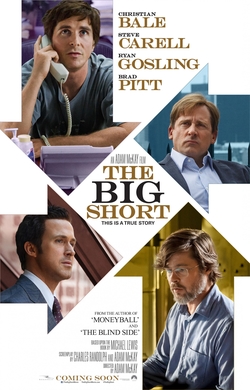‘The Big Short:’ 2008 Financial Meltdown Portrayed in an Entertaining, Yet Serious Manner

CDS (Credit Default Swaps,) LIBOR (London Interbank Offered Rate,) CDO (Collateralized Debt Obligations,) Leveraged ETF (Exchange-Traded Fund,) financial derivatives, margin calls, hedge funds, junk bonds …
Most of us are more familiar with Kim Kardashian’s backside than we are with any of these terms. And yet that alphabet soup of letters and jargon not only rules our daily lives but will also determine how we spend our golden years and what sort of world we’ll leave our children. (I am aware that for some people Ms. Kardashian’s posterior is the fulcrum of their daily lives, but I figure they’re far too focused on that to bother reading this.)
The point has been made before, and emphasized in the new financial potboiler The Big Short, that this language has been deliberately created to keep outsiders outside. If the financial “Masters of the Universe” were forced to use words normal people do we’d all see quite clearly that Wall Street is nothing more than a betting parlor run by and for gamblers who speculate with other people’s money. This deliberate obfuscation is one of several factors which led to the Great Recession of 2008.
And that financial collapse led in turn to Michael Lewis’ best-selling book The Big Short: Inside the Doomsday Machine. Lewis, author of The Blind Side: Evolution of a Game, Moneyball: The Art of Winning an Unfair Game, and other financial-market themed books, examined the roots of the subprime mortgage crisis and the resulting bursting of the housing bubble. Lewis specifically looked at several individuals who saw the problem as early as 2004 and actually bet against the housing market—which, in 2004, was the same thing as betting against all the Wall Street grandees and the U.S. government.
Adam Mckay: From Anchorman to The Big Short.
And how, I wondered, could such a book ever be turned into a movie comedy … especially when directed by Adam McKay, the man responsible for most of Will Ferrell’s manchild comedies?
Shows you how much I know.
McKay and Charles Randolph have adapted Lewis’ book into one of the darkest, cynical comedies in recent years. McKay and Randolph center the film on four eccentric men (to put it charitably) and the various paths they all took in realizing the truth behind, and ultimate collapse of, the economy. The underpinnings of subprime market were so outrageously false (if not, in fact, felonious) that some of these men, like most of the audience, couldn’t at first believe Wall Street types could be so stupid. It’s only later that they, and we, come to understand that most knew the system was corrupt, but were making too much money to stop.
The script, as well as McKay’s direction, is as free-wheeling as the crazy times it covers. The film is shot with a lot of jittery hand-held camera work which I felt mirrored the teetering-on-the-edge quality of the times. (But I should mention my far-too-adorable son, who otherwise loved the film, disliked the camerawork.) Outlandish comedy scenes (made even more funny/sickening because they’re true) are bumped up against reminders that behind these fiscal shenanigans were people who lost homes, jobs and even their lives.
One of McKay’s most interesting cinematic choices is the Brechtian tricks he employs. If you were paying attention in class you might remember that genius playwright Bertolt Brecht studded his work with moments meant to remind the audience they were watching a play, requiring them to think about the issues being dramatized and not be emotionally bamboozled by the theatrics.
Financial Fish Stew
Get a load of me talking about Brecht in a Hollywood movie review! but McKay continually breaks the fourth-wall with dialogue addressed directly to the audience—sometimes just bitchy asides from a principal character, but on other occasions the movie stops dead in its tracks and oddly random celebrities explain some of the most confusing terms and concepts: actress Margot Robbie in a bubble bath explaining what subprime loans are, chef/author Anthony Bourdain demonstrating how collateralized debt obligations (CDO) work using day-old fish, pop star Selena Gomez, paired with economist Dr. Richard Thaler at a blackjack table in Vegas, showing why synthetic CDOs destroyed the global economy. The Big Short does an amazing job making difficult-to-understand concepts understandable and these sequences are bizarre, informative, and wildly entertaining.
McKay has hedged his own bets by filling out his ensemble cast with strong, fearless performers attacking their roles with gusto. Ryan Gosling, Christian Bale, Steve Carell and Brad Pitt (who also produced) are the big marquee names and each gets a chance to shine—Gosling is especially funny as a slightly slick and smarmy trader who serves as narrator and Carell is the film’s conscience, always reminding us of the body count behind the hijinks. Bale’s performance as an Asperger’s-afflicted statistics-genius with only one eye is amped up to eleven on the dial; for all I know the real-life figure might be like that, but I tend to think that giving an actor a chance to play someone with emotional/mental challenges (with one eye no less!) is like waving a red flag in front of bull; Bale certainly charges ahead.
The film is filled with terrific performances all around; including Jeremy Strong, Rafe Spall, Hamish Linklater, Finn Wittrock, Tracy Letts (Pulitzer winner for his play August: Osage County), and Point Park University graduate John Magaro.
I do wish that McKay hadn’t chosen to eliminate Meredith Whitney from the story; she was one of the book’s key figures and foresaw the collapse of Citigroup and Bear Stearns. This is such a guy-centered movie and adding a woman into the mix could have brought the film some interesting energy.
But that’s my only complaint—Having spent most of 2015 awash in movies where there’s more intelligence and attention put into the effects than the plot, Big Short is a blessing.
In fact, having spent the year beaten down by movies screaming “love me! love me!” it’s great to see something not worried about pissing off an audience. McKay’s take is a blistering indictment of the bankers, traders, ratings analysts, and government regulators who allowed, if not encouraged, the disaster. McKay reminds us that more than $16 trillion was wiped out during the recession because of unethical, and probably criminal, activity and yet only one low-level functionary has ever gone to jail.
The banks only grew bigger and more opaque, the agencies which rated junk securities as AAA (and who were paid by the banks they were rating) were never held to account for their double-dealing and the Federal Reserve Bank which sat by and watched/let it all happen (Fed prexy Alan Greenspan infamously denied a housing bubble right up until the very last-minute) is now even stronger and more deeply intertwined in the markets.
In a terrifying postscript McKay notes that banks have once again started selling collateralized debt obligations—but only under a different name: BTO (“Bespoke Tranche Opportunity” … I’m not kidding.)
You may leave the theater seething, but you’ll also leave having been vastly entertained. And who knows—you might even start fixating on something other than Kim Kardashian’s ass.
Ted Hoover is a Pittsburgh based writer and critic.
Movie poster courtesy of Paramount Pictures
Share on Social Media
Follow Entertainment Central
Latest Stories
Sign up for the EC Newsletter







